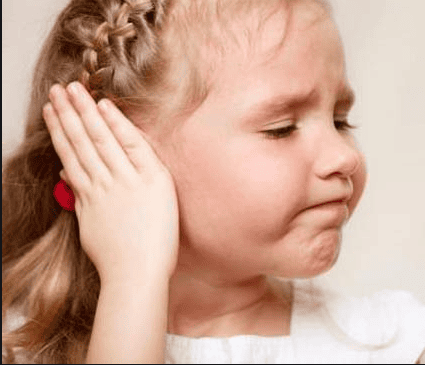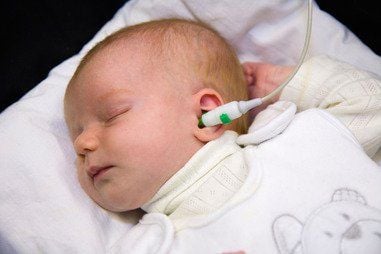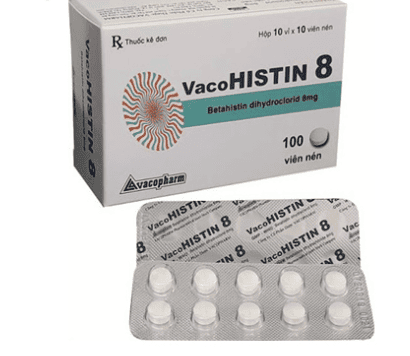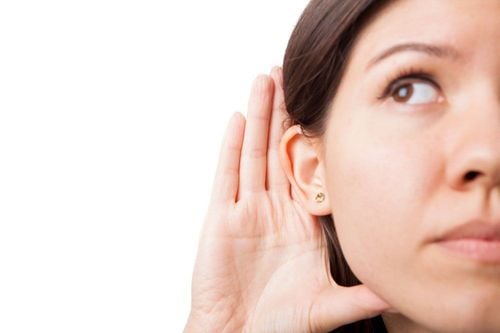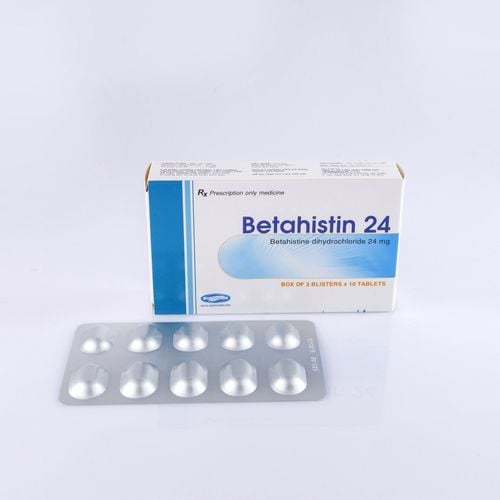This is an automatically translated article.
Hearing loss after infancy can be caused by many causes, in which hearing loss is divided into two main types: congenital hearing loss and acquired hearing loss. The earlier the symptoms of hearing loss are detected, the better the child has the better chance of getting early treatment for the best hearing recovery. This article will provide you with information about hearing loss in young children after infancy.
1. How to check the child's hearing is good or not?
To know the child's hearing ability, the only way to know for sure is to take the child's hearing test. Once your baby is born, they will likely be screened for newborn hearing in medical facilities before being discharged from the hospital. After that, you should take your child to see a doctor to have his hearing checked at each routine health checkup.
In some preschools, children will also be screened for hearing health during the children's hearing and vision health screenings at the educational institution. And most of the times when children are admitted to educational institutions, there are regular hearing and vision exams for students. Parents should also check to see if these screenings are available at your child's preschool or school.
However, despite such screenings, parents and caregivers are often the first to notice abnormalities and problems with their child's hearing - so between visits You should also pay attention to possible warning signs of a hearing problem, such as your child not correctly answering simple questions and following directions.
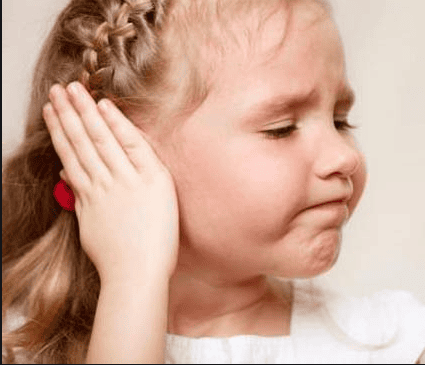
Sàng lọc về thính lực giúp kiểm tra thính giác của trẻ có tốt hay không
Check for all signs of hearing problems in your child. If you notice any of the symptoms below or have a feeling something is wrong, talk to your child's doctor. Includes:
Don't like the game; Does not recognize the names of familiar people, pets, and objects; Unable to follow simple commands; Do not turn your head when you hear sounds coming from another room; Failure to express desire; Do not imitate simple words; Do not use at least two words; Not responding to music; Do not say anything; Do not point at simple body parts or look at familiar objects when asked. Hearing problems can have a variety of causes - babies who are not yet walking or talking may develop a little slower than average including hearing development and these children will soon begin to develop their hearing. keep up with other normal children. And a child who doesn't respond when you talk to them may simply be paying attention to something else or feeling tired.
But if your child has a hearing problem, the earlier it is diagnosed and treated with individual language or hearing aids, the more likely it is that your child will develop normally and receive developmental milestones in language and speech.
2. When your child has hearing problems, what will the doctor do?
Your child's doctor may conduct a hearing test and then refer you to an audiologist (hearing specialist) if your child has abnormalities during the hearing test. hearing. Your child may also refer you to an audiologist or another specialist - such as an otolaryngologist - if your child has below-average speech and language problems or if he or she does not. normal developmental milestones are achieved or if the child has persistent drainage behind the eardrum.
An audiologist will tailor another hearing test - using subjective and objective methods - to your child's age and developmental level.
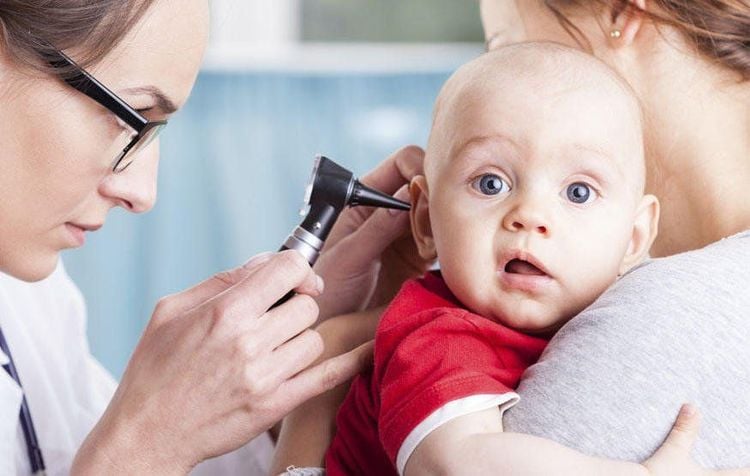
Bác sĩ thính lực sẽ giúp trẻ có phác đồ điều trị tốt nhất
3. Causes of Hearing Problems
There are two main causes of hearing loss. One is congenital (meaning a child is born with a hearing problem) and acquired (meaning a child is born with normal hearing but is later damaged by a cause). some person). About 2 to 3 out of every 1,000 healthy babies in the United States are born with significant hearing loss. (Children who need to be admitted to the neonatal intensive care unit are more likely to have hearing problems.)
Sometimes hearing loss is genetic - even if both parents have normal hearing. In other cases, a baby's hearing is damaged because the mother has a viral infection during pregnancy, such as German measles (rubella), toxoplasmosis or herpes. Some babies are born with hearing loss due to low birth weight or premature birth, or abnormal inner ear development. In some cases, there is no explanation.
After birth, a baby can have hearing loss because the nerves in the inner ear are damaged by an injury, tumor, or infection, such as chickenpox, flu, meningitis, or leukemia single-person. Medications such as chemotherapy drugs, salicylates, loop diuretics, and some intravenous antibiotics can also cause hearing loss.
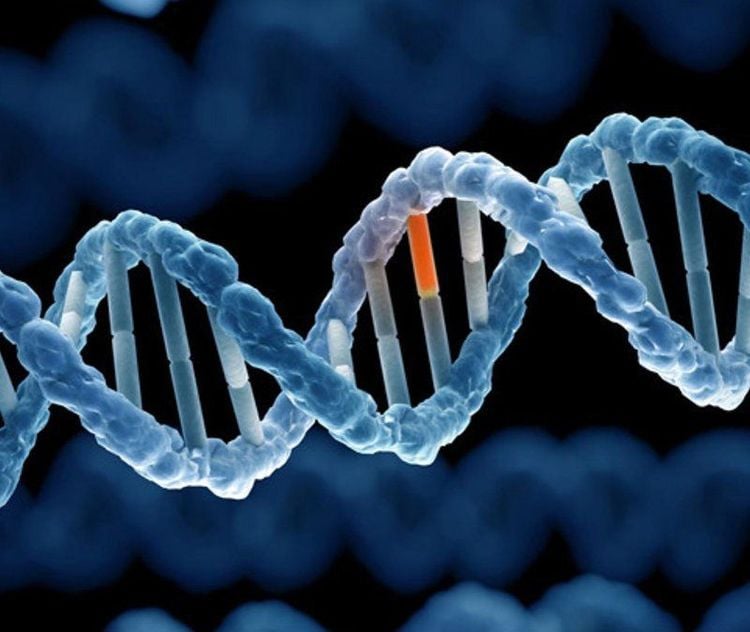
Suy giảm thính lực có tính chất di truyền
Hearing loss can also be caused by fluid retention, trapped in the middle ear - after an infection, or from poor ventilation of the ear. This fluid can stay in the ear for weeks, even after the infection has cleared up. Fluids can impair hearing until the fluid is absorbed or surgically removed. (It's hard to hear through a fluid-filled ear.)
Permanent hearing loss due to fluid retention is rare, but it can occur in children with untreated fluid retention, resulting in structural changes in the eardrum or auditory bones.
If your child has recurrent ear infections or middle ear effusion, the doctor may recommend a hearing test. Your doctor may also recommend placing drains in your child's eardrums so that any fluid that has built up behind them will be able to drain out and the ears to clear.
Another cause may be a foreign object obstructing the child's hearing. Earwax and foreign objects in the ear can also cause temporary hearing loss. However, this condition should resolve after the foreign body is removed.
4. How are hearing problems treated?
If your child is born deaf or develops problems due to illness, it may not be curable, but there are options to help your child improve hearing as much as possible. Talk to an audiologist about possibilities for your child, such as a hearing aid (a small electronic device, worn inside or behind the ear, that amplifies sound), an FM trainer (to amplify a selective ways of an individual's voice - such as a teacher's voice amplification), or a cochlear implant.
A cochlear implant consists of electrodes inserted into the inner ear (cochlea) and an external device that receives and processes sound. The implant replaces the inner ear by carrying auditory signals to the brain. If your child's hearing loss is classified as severe or severe, he or she may be treated for a cochlear implant.
Implants help many children with severe hearing loss who cannot benefit from hearing aids. But even with hearing aids or implants, most children will need speech therapy for several years to be able to speak in an understandable way.
For some children with hearing loss, unable to speak or hear. In these cases, it is important for children to start learning sign language as soon as possible. Some families choose an integrated approach that allows the child to function as best as possible in both the deaf and hard of hearing community.
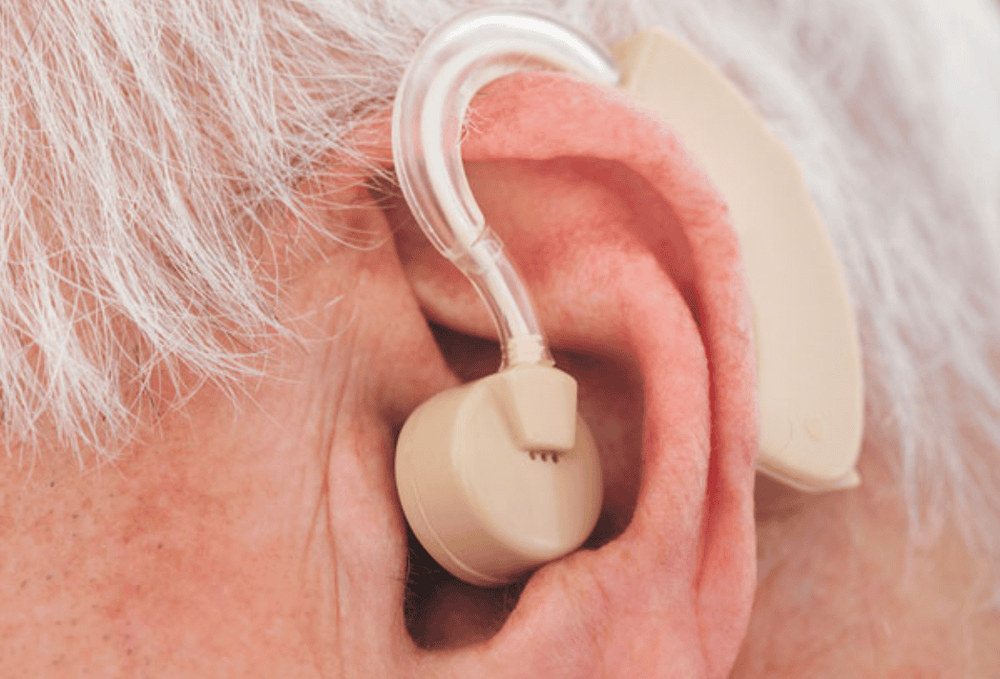
Máy trợ thính là một phương pháp giúp trẻ nghe tốt hơn
5. What can you do to prevent hearing loss in your newborn?
Although some causes of hearing loss cannot be prevented, there are some things you can do to reduce your risk from other factors:
Never insert anything into your ear canal. your child and teach him never to put anything in his ear. Even cotton swabs with cotton tips can damage your baby's eardrums and ears. Immunize your child against diseases during this time, as some diseases like mumps can cause hearing loss. Watch your child for colds and ear infections. If your child shows signs of impaired hearing or speech after an ear infection, talk to your doctor about getting your child's hearing tested as soon as possible. Do not expose your child to excessively loud noise, especially noise that goes on for an extended period of time. Excessively loud music or television (especially from headphones), devices or toys can damage your child's hearing over time. If you have to use the volume too loud to hear the noise, your child is also at risk of hearing damage from noise. Detecting children with hearing loss early will make treatment easier. If your baby is of newborn age, you should take him to a health facility for newborn screening and have an intensive hearing test and a comprehensive health check. If the baby is beyond the newborn age, you should give him a general health check. This will help to screen the disease comprehensively, effectively, find the exact cause of the disease.

Ba mẹ có thể đưa trẻ đến Bệnh viện Đa khoa Quốc tế Vinmec để khám sức khỏe tổng quát cho trẻ nhỏ
Currently, all Maternity Care Packages at Vinmec have hearing tests for babies right after birth, not only helping to check the baby's hearing but also helping to check the heart health, detect diseases. on congenital heart. In addition, Vinmec provides a general health examination program for young children, helping children outside the newborn age to have an in-depth hearing test and find out the exact cause of the disease.
Baby hearing tests are performed by highly qualified and experienced audiologists. Using modern examination techniques, it helps to accurately determine the cause of the disease to apply a reasonable regimen.
Please dial HOTLINE for more information or register for an appointment HERE. Download MyVinmec app to make appointments faster and to manage your bookings easily.
Reference source: babycenter.com




